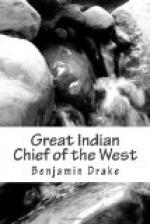CHAPTER VIII.
Black Hawk, Naopope, the Prophet and others confined at Jefferson Barracks—In April 1833 sent to Washington—Interview with the President—sent to Fortress Monroe—Their release—Visit the eastern cities—Return to the Mississippi—Conference at Rock island between Maj. Garland, Keokuk, Black Hawk and other chiefs—speeches of Keokuk, Pashshepaho and Black Hawk—Final discharge of the hostages—Their return to their families—Black Hawk’s visit to Washington in 1837—His return—His personal appearance—Military talents—Intellectual and moral character.
Black Hawk, his two sons, Naopope, Wabokiesheik, and the other prisoners, who under the treaty of 21st September, were to be held as hostages, during the pleasure of the president, having been sent down the Mississippi, to Jefferson Barracks, under charge of Lieutenant Davis, were immediately put in irons, a measure of precaution, apparently, as unnecessary as it was cruel.
“We were now confined,” says the old chief, “to the barracks, and forced to wear the ball and chain! This was extremely mortifying, and altogether useless. Was the White Beaver [Gen. Atkinson] afraid that I would break out of his barracks and run away? Or was he ordered to inflict this punishment upon me? If I had taken him prisoner upon the field of battle, I would not have wounded his feelings so much, by such treatment, knowing that a brave war chief would prefer death to dishonor. But I do not blame the White Beaver for the course he pursued—it is the custom among white soldiers, and I suppose was a part of his duty.
“The time dragged heavily and gloomily along throughout the winter, although the White Beaver did every thing in his power to render us comfortable. Having been accustomed throughout a long life, to roam through the forests—to come and go at liberty—confinement under any such circumstances, could not be less than torture.
“We passed away the time making pipes, until spring, when we were visited by the agent, trader, and interpreter, from Rock Island, Keokuk, and several chiefs and braves of our nation, and my wife and daughter. I was rejoiced to see the two latter, and spent my time very agreeably with them and my people as long as they remained.”




